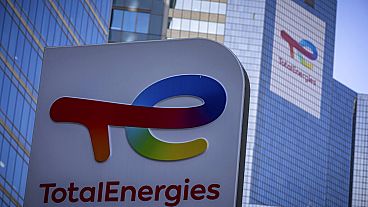Festive TV adverts have woven themselves into the fabric of Christmas tradition - and the marketing budgets are only getting bigger. Euronews Business looks at just how lucrative this holiday season is for companies.
Christmas is once again nearly upon us and it's going to be costly for companies digging into their advertising budgets with UK firms set to spend roughly £9.5 billion (around €10.9bn) on festive marketing.
That’s according to recent figures from the Advertising Association (AA) and the World Advertising Research Center (WARC), which noted this number is up 4.8% compared to last year’s record spend of £9 billion.
However, is splashing the cash really worth it?
The Christmas commercial boom
Televisions became a staple item for many households in the 1950s and 60s, and advertisers soon began to use the magic of moving pictures to capture consumers.
In a Hoover advert from 1961, broadcast before the advent of colour TV, a woman next to a monochrome Christmas tree is opening her presents.
“What would mother really like for Christmas?,” asks the voice-over.
“A hoover constellation!”
The woman nods at the camera enthusiastically.
Jump ahead thirty years and beverage company Coca-Cola brought us another festive ad, thankfully filled with fewer gender stereotypes.
Accompanied by the sound of sleigh bells, we see the brand’s iconic red trucks en route to deliver their trademark drink to stores, each pack emblazoned with a picture of Santa Claus in his red suit - an outfit whose origin is frequently, but incorrectly, attributed to Coca-Cola’s marketing team.
Now fast-forward to the modern day, and the festive campaigns have advanced even further.
In order to compete for public attention, it’s now common for companies to add some bells and whistles to their campaigns (literally and figuratively).
This often means star-studded casts (Ryan Reynolds, Rick Astley), glossy special effects, and a track from a musical heavyweight - think Elton John or Andrea Bocelli.
Unlike the rest of the year, when adverts are generally viewed as annoying or trivial, Christmas is a season when some viewers may actually be enthusiastic about having their TV shows interrupted.
When we think of ads created by UK retailer John Lewis, or perhaps the commercials released by Apple in the US, we can see how festive marketing is able to create a national, if not international, buzz.
The golden quarter
Jamie Peate, who is global head of retail effectiveness at supermarket giant Aldi, told Euronews Business that the Christmas period is the “golden quarter” for businesses, meaning it’s worth spending money on festive campaigns.
“For many retailers, they are taking the largest amount of revenue and profit in that period,” he explained.
Nor is it just about short-term revenue.
Since 2016, Aldi’s Christmas advertising has centred around its mascot, ‘Kevin the Carrot’, who has become the low-cost face of the brand’s festivities.
We’ve seen Kevin aboard the Polar Express, he’s taken a tour of Willy Wonka’s Chocolate Factory, he’s graced the stage as The Greatest Showman, and he even has his own X account (with a respectable 17,9 k followers).
Peate said the strategy here is about building long-term brand recognition.
“In sticking to that character [...] and having a rule of thumb where we stay around 80% the same, but 20% different, we've massively built the brand love. He's something that people can easily see and attribute to Aldi straight away.”
Santa Claus is coming to…TikTok?
Just as the birth of television remapped the marketing landscape, social media and streaming platforms are now changing the way advertisers are spending their money.
According to research published by Omdia earlier this year, linear TV viewing is still the most popular form of video viewing in Europe, but these figures are falling.
Throughout 2022, Germany saw the largest decline in linear viewing figures (-19.3 minutes), and in the UK, Sweden, and the Netherlands, less than half of viewing time is now linear.
In response to this shift, investment in digital advertising is growing.
Compared to last year, the AA said companies are set to spend 20.2% more on broadcast video on demand campaigns, and advertisers now spend four out of five pounds on online advertising.
“We treat each platform differently,” Bhavin Pabari, a strategy director at Mother agency that has created Christmas ads for retailer M&S and fast food chain KFC, said.
“We know on channels like Tik Tok that as soon as you put anything that looks too glossy or too shiny in front of people, it's seen as an ad and they will go straight past it.”
James Murphy, the founder and chief executive of New Commercial Arts, who worked on the latest Christmas campaign for supermarket chain Sainsbury’s, echoed this sentiment.
“Rather than creating one epic silver bullet piece of content, as you might have done ten years ago, it's more like you're creating a cloud of content that works in different ways, for different people, with slightly different relevant food or drink messages within them.”
Murphy also explained that there are a number of ways to measure the success of festive campaigns.
Advertisers notably look at footfall in stores, web traffic, sales figures, but also “softer” indicators such as consumer sentiment towards brands - which is often formed over a longer period of time.
Does Europe love Christmas ads?
In the US and the UK, Christmas TV adverts seem to attract more public attention than in a number of European countries, but there is still no shortage of festive creativity.
At Euronews, we’ve come up with some of our favourites to leave you with below.



